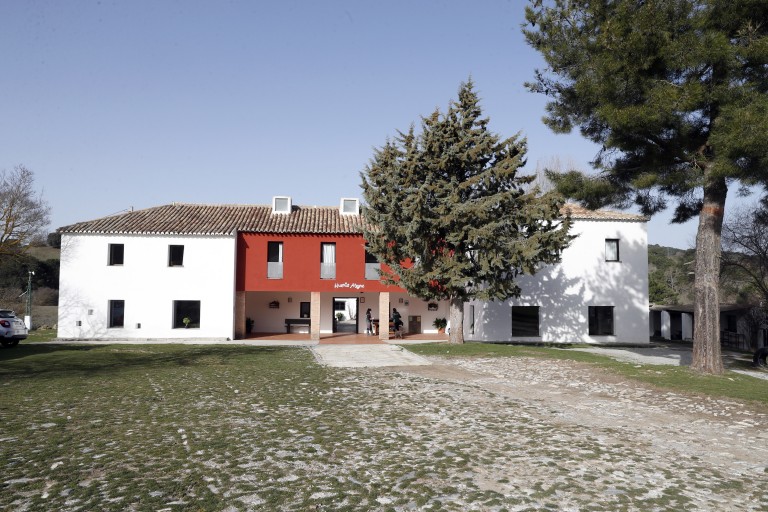Farm schools: 40 years of freethinking and environmental awareness
At the end of the 1970s, when climate change was not a topic of conversation and there were no coloured bins for separating rubbish, youth movements saw environmental education as the ideal seed to make democracy flourish. Thus were born the first farm schools, which have been "sowing" free-thinking and conscientious citizens for the last 40 years.
A new way of educating
The origin of the first one in Spain, La Huerta La Limpia, (Guadalajara, 1978), illustrates well the spirit that drove these projects: it was set up thanks to a loan from the survivors of the massacre of the Atocha labour lawyers, among them the former mayor of Madrid Manuela Carmena, who saw a new way of educating as the best tool to combat fascism.
A way of learning inspired by the Granada colonies promoted by Berta Wilhelmi at the end of the 19th century, in the camps of the Institución Libre de Enseñanza (ILE) or in the Modern School promoted in Catalonia by Francisco Ferrer Guardia (1901).
Their aim: "That contact with nature would create spaces for children to reflect, motivate them to investigate, to learn about natural processes, and to question the social model and unbridled consumption that was beginning to prevail", explains Mari Luz Díaz, founder and current director of another of the pioneering farm schools, "Huerto Alegre" created by eight students from the University of Granada in the nearby mountain range of La Almijara in 1982.
Not far from there, in Dúrcal, another group of young people from the Madrid neighbourhood of Baztán-Aluche working on educational and cultural activities with young people at risk of exclusion found in an old mill in the foothills of the Sierra Nevada, a place where they could develop a new way of teaching which, in their opinion, had not brought about the longed-for transition to democracy.
"We didn't come out of the transition too enthusiastic, our expectations were more demanding. We realised that either we changed the way we taught or it would be difficult to change society", explains Josechu Ferreras, founder of El Molino de Lecrín (1983) and, later, of the El Remolino Nature Centre in the Sevillian town of Cazalla de la Sierra (1992).
Education to change society
Despite the idealism of the projects, their members had to learn about finance and management in order to set themselves up as cooperatives and take out mortgages to buy and restore the spaces which housed them, which were sometimes in a very precarious state.
As well as fitting out dining rooms, dormitories and workshop rooms, they also created vegetable gardens, small farms... and gradually opened their doors to their protagonists: the children.
What do they do, for example, during a stay at Huerto Alegre.
They take care of the animals: graze the goats, milk the cows, feed the chickens and collect eggs; work the vegetable garden; go out into the forest and learn how a balanced ecosystem works, participate in workshops on science, ecology or product transformation, where they make cheese, butter, jam, preserves, soap, among others", says Díaz.
Ana Enríquez, who spent a week in El Molino de Lecrín at the end of the 90s, aged 12 and with hardly any contact with the rural world until then, remembers it as a life-changing experience: "Until then I thought that bread, meat or eggs came from the supermarket," she laughs. I remember more of what I learned that week than I did in a year at school.
Screen detox centres
Asked how pupils have changed over the past four decades, Díaz says that today's children arrive "much more motivated. When we started there was hardly any environmental awareness, some would come and throw stones at the animals.
Ferreras agrees that "today's children arrive at a very high level", and now the challenge is for the farms to be "screen detox centres" for them.
And with regard to parents, "we have gone from them seeing these stays as holidays to wanting them to leave as ecologists," he says.
The topics have changed: "In the early 1980s, we didn't talk about climate change, plastic pollution or renewables, we talked about nature conservation. The vision of environmental education was mostly naturalistic, whereas now it is more focused on solving environmental problems," he adds.
Challenges
However, the main lesson that these centres want to teach future adults has not changed: "Nature is interrelated and nothing is independent. Human intervention can take these fragile processes into account and protect them with respectful ways of being in the world, or destroy their balance", sums up the director of Huerto Alegre.
Neither has one of its historical challenges: to reach all children, not only those who can afford to pay for their stay (in Spain, they agree that there has hardly been any aid in this area) and that environmental education should not be "a question of convinced voluntarists", but should be included in the educational curriculum.
Ferreras points out that it is also important "to ensure that environmental education is not trivialised: our task is not to train activists, but to give people the ability to transform their environment and the way they act in their daily lives".
In Spain there are currently more than a hundred farm schools that act as a bridge between school and nature, and through which, on average, between 5,000 and 10,000 students a year pass, depending on their size. Five of the farms consulted by EFE for this report are experiencing difficulties due to the halt in visits and stays due to the COVID19 pandemic and the lack of aid. EFE
Original article from EFE Verde.
Translated with www.DeepL.com/Translator
